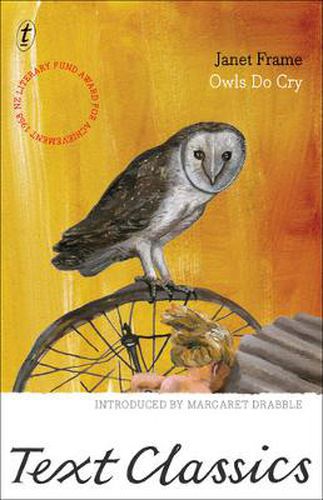Readings Newsletter
Become a Readings Member to make your shopping experience even easier.
Sign in or sign up for free!
You’re not far away from qualifying for FREE standard shipping within Australia
You’ve qualified for FREE standard shipping within Australia
The cart is loading…






So the day promised fair, and the sea lay like a quilt with the waves tucked under, and the trees wavering like leafless water, cut to fit from a transparent block of blue air and frost.
Owls Do Cry
tells the story of the Withers family: Francie, who is twelve and about to start work at the woollen mills, hard drudgery sweetened with the thrill of riding a bike to work; Toby, who would rather play at the dump than go to school, where the dark velvet cloak of epilepsy often wraps itself around him; Chicks, the youngest; and Daphne, whose rich poetic way of seeing the world leads to a heartbreaking life in institutions.
Janet Frame writes of hardship, poverty and tragedy with beauty and a deep sensitivity. Owls Do Cry is a poetic masterpiece.
$9.00 standard shipping within Australia
FREE standard shipping within Australia for orders over $100.00
Express & International shipping calculated at checkout
So the day promised fair, and the sea lay like a quilt with the waves tucked under, and the trees wavering like leafless water, cut to fit from a transparent block of blue air and frost.
Owls Do Cry
tells the story of the Withers family: Francie, who is twelve and about to start work at the woollen mills, hard drudgery sweetened with the thrill of riding a bike to work; Toby, who would rather play at the dump than go to school, where the dark velvet cloak of epilepsy often wraps itself around him; Chicks, the youngest; and Daphne, whose rich poetic way of seeing the world leads to a heartbreaking life in institutions.
Janet Frame writes of hardship, poverty and tragedy with beauty and a deep sensitivity. Owls Do Cry is a poetic masterpiece.
In the tip, the siblings Francie, Toby, Daphne and Chicks meet again in death and madness and dark moments, and talk to one another and search for treasure. Sometimes the tip is smoothed over – Chicks as an adult will have her house built upon it – but Daphne is always there, ‘in the dead room’, with her shaved head, waiting to be made better and returned to the nightmare of the woollen mill. In the place on the hill the patients’ handwork reminds Daphne of the woollen mill; she screams ‘to see the mounds of wool and the dazed people picking threads, like red and yellow worms, and sewing, and digging needles in canvas, embroidering a rose, because there seemed a rule, everywhere, that roses do not grow in gardens any more but upon tablecloths and cushions and fire screens and hearth rugs…’
And Janet Frame, she is gone, but she pierced the world with her eyes and her senses and we’ll always have the treasure, like this, her first novel, sitting among the best modern novels, so sharp and vivid a voice, so sure so early on, despite the hurt and horror of what she had already been through; a writer and a poet waiting always inside her (and here now) in the place of treasures and darkness, with her own sense of punctuating space, her own way of seeing how the world is like the body and how the body contains a torrent of images and worlds of associated sensations, like ‘crumbling farmhouses, eyeless, with their door open upon a yellow blotched throat of corridor lined with chains of decayed rosebuds and lilies’. Always decay, for someone who had faced so much of it, and death. But a ‘buoyancy of creativity and brightness’ there too, as Margaret Drabble suggests in her introduction. At the end, you are lying down, there is weight on your chest, but your mind is lit up.